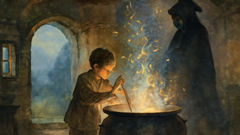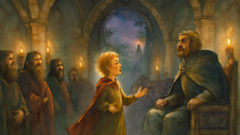Introduction
Across the rolling emerald hills and mist-clad valleys of medieval Wales, where ancient oaks whispered to the wind and rivers sang in secret tongues, stories were not merely told—they were woven into the fabric of existence. Amidst this landscape, both fierce and gentle, the legend of Taliesin was born—a tale as enduring as the stones of Caer Siddi, where stars and mortals sometimes met. Here, life unfolded in cycles of hardship and hope, of mystery and revelation, and every child learned early that fate was as restless as the sea beyond the mountains. The world was alive with magic, whether in the shimmer of dew on bluebell meadows at dawn, or in the hush that fell at twilight, when elders gathered near flickering hearths to pass on wisdom as fragile as cobwebs, yet as strong as the roots beneath their feet.
It was in this realm that Taliesin’s story took shape—born not of noble blood, but from a prophecy uttered in shadows, a chase across enchanted waters, and the resilience of a spirit determined to find its place. His journey began not with grandeur, but with a humble woman’s longing and a magician’s designs. It would carry him through transformations both wondrous and terrifying: a boy who would taste the wisdom of the world and pay dearly for every secret gained. The land itself seemed to watch his path—its creatures, its wild places, and the fickle fates that governed even kings.
From the smallest cottage to the mightiest court, tales of Taliesin’s birth and becoming would echo for centuries. He was a child of river and fire, of shape-shifting trials and poetic revelation. And as his legend grew, so too did the belief that wisdom could dwell in unlikely hearts, that poetry could shape destinies, and that the song of one voice might reach across time itself. To follow Taliesin is to step into a world where every stream holds a secret, every transformation a lesson, and where the greatest magic lies not in the spell, but in the words that endure beyond all endings.
The Cauldron of Inspiration: Gwion Bach’s Awakening
Long before Taliesin’s name rang out in the halls of kings, he was known as Gwion Bach, a poor orphan in the service of the wise enchantress Ceridwen. She lived by the shores of Llyn Tegid, her cottage half-swallowed by brambles and the perfume of herbs. Ceridwen was renowned for her knowledge of the arcane, but her heart was heavy with sorrow for her son Morfran, whose hideous appearance fated him to scorn. She resolved that he should have a gift that none could deny: wisdom surpassing all men, distilled from the fabled Cauldron of Inspiration. For a year and a day, the cauldron simmered in her hut, tended by Gwion Bach’s small, steady hands.

The work was endless. By day, Gwion chopped roots and gathered rare blossoms from the bog. By night, he stirred the bubbling potion, watching sparks leap and swirl above its rim. The scent was dizzying—sometimes sweet as apple, sometimes bitter as despair. Ceridwen’s spells wound through the air like smoke, weaving enchantment deeper than dream. But on the final day, as the cauldron’s power reached its peak, three scalding drops leapt out and landed on Gwion’s thumb. He yelped, thrust his hand into his mouth, and in that instant, all the secrets of the world flashed through his mind like a thousand lightning strikes. He saw the birth of stars and the end of empires. He felt the laughter of brooks, the sorrow of wolves, and the wisdom of ravens.
Ceridwen’s voice thundered with fury as she realized what had happened. She lunged at Gwion, and the chase began—a pursuit that would shape destiny itself. Armed now with the cauldron’s wisdom, Gwion transformed to escape: first into a hare, leaping through tangled hedges; then a fish, slipping through the cold heart of the river; then a bird, soaring above the startled crows; and finally a grain of wheat among a million others. But Ceridwen was relentless. She became a greyhound, a trout, a hawk, and at last, a black hen who swallowed the wheat whole.
Yet in her belly, the seed of wisdom took root. Months passed, and Ceridwen bore a child—radiant, beautiful, and otherworldly. Though her anger had faded, she could not bring herself to destroy the boy, now the vessel of the wisdom she had sought for another. Instead, she wrapped him in a leather bag and cast him into the river, trusting fate to decide his course. And so, the child drifted—cradled by current and starlight—until he was found by Elffin ap Gwyddno, son of a minor lord whose fortunes had waned with the sea’s retreat.
Elffin was gentle, melancholic, and kind-hearted, longing for luck to lift his family’s burdens. When his servants hauled in their nets on Beltane morning, they drew out the leather bag and discovered the radiant child within. The boy’s first words shimmered with prophecy and poetry: “Fair Elffin, cease your weeping—no catch will you ever have that is worth more than me.” From that moment, the tides of fortune shifted. Elffin named the boy Taliesin, meaning “radiant brow,” and brought him home, unaware that his new son’s destiny would outshine kings and legends alike.
The Child of Prophecy: Taliesin’s Rise and the Jealousy of Kings
Taliesin grew swiftly, not just in body but in brilliance. Words came to him like rivers after rain—poems and riddles spilled from his lips, and no question confounded him. Elffin cherished his foster son, marveling as luck blossomed at their hearth: the once-barren fields yielded golden grain, and the sea sent nets brimming with fish. Word of Elffin’s prosperity—and his mysterious, radiant child—drifted to the ears of King Maelgwn Gwynedd, a ruler both shrewd and suspicious, whose court glittered with bards eager for favor.

One winter day, Maelgwn summoned Elffin, demanding that he prove his luck was not mere boasting. Elffin’s honest tongue, sharpened by years of hardship, replied, “I have a son whose wisdom outshines your bards.” The court erupted in laughter, but Maelgwn’s pride bristled. He ordered Elffin thrown in a dank prison and challenged Taliesin to appear at court and best his finest poets, or else Elffin would rot in chains. The news reached Taliesin as he sat beneath a willow, composing verses to the wind. Calmly, he rose and journeyed to the royal hall, where torches flickered on the faces of doubters and the air quivered with anticipation.
The king’s chief bard, Rhun ap Nefydd, stepped forward with riddles designed to confound. Yet Taliesin answered each with ease, his words unfurling like banners in the mind—riddles of moon and tide, oak and eagle, each resolved with sparkling wit. Then, standing in the center of the hall, the boy’s voice deepened into song. He sang of the world’s creation, of shadow and sunlight, of dragons and hidden springs. His verses painted landscapes no eye had seen and revealed truths the wisest feared to know. The court grew silent; even Maelgwn’s hounds lay still. Tears shone on cheeks unused to tenderness. When Taliesin finished, none dared challenge him. The king, humbled and awed, released Elffin and offered them both places of honor.
But not all hearts were moved to admiration. Jealousy festered among the court’s bards. In secret, they plotted to expose the boy as a fraud or worse—a changeling conjured by dark arts. They spied on Taliesin, searching for evidence of trickery, yet every attempt rebounded upon them: their own riddles turned to nonsense, their harps slipped from tune. Maelgwn himself began to wonder whether such power belonged in mortal hands. Rumors spread: some said Taliesin was no child but an immortal spirit; others whispered he was cursed. Yet Elffin knew only pride and gratitude, for Taliesin’s wisdom had restored not just his fortune, but his hope in a world remade by wonder.
Journeys Beyond: Trials, Transformations, and the Song of Wisdom
As Taliesin’s fame spread beyond Gwynedd’s borders, so too did the stories of his birth and powers. Pilgrims and lords alike sought his counsel. Some asked for blessings on their crops or protection for their kin; others hoped to uncover the mysteries behind his prophetic gifts. Taliesin answered all with patience, but he sensed that destiny had greater trials in store. He felt restless in the king’s hall—a yearning for something deeper than applause or gold. One spring night, guided by dreams and omens, he slipped away from court, leaving only a poem behind:

“I go to seek what lies beyond,
Where river meets the sky;
For wisdom’s fire is never tamed,
Nor bards content to lie.”
Taliesin wandered the wilds of Wales—across brooding mountains and through ancient forests veiled in moss. He met druids who read omens in crowflight, wise women who healed with song, and shepherds who spoke with wolves. Each encounter tested him: sometimes he was asked to solve riddles as old as stone, or to heal wounds that would not close. In a storm-battered glen, he faced a spirit who demanded a soul in exchange for safe passage. Taliesin offered a poem instead—a song so full of longing that even the spirit’s anger softened into tears. In return, he was shown visions of the otherworld: Caer Siddi’s shining halls, where souls danced in endless twilight; fields where no sorrow could follow; lakes whose depths mirrored the stars.
But not all his journeys were gentle. In the mountains near Cader Idris, he was seized by bandits who hoped to ransom the legendary boy. Bound and threatened, Taliesin did not plead or curse. Instead, he sang a tale of loss and redemption so haunting that the leader—whose own child had vanished—fell to his knees. The bandits released Taliesin and vanished into the mist, changed by his words. Yet such power weighed heavily. Taliesin wondered if wisdom was meant to be shared or guarded, whether he was a blessing or a burden upon the world.
One evening by a lake silvered in moonlight, Taliesin met an old woman who was more than she seemed—a shape-shifter, perhaps even Ceridwen herself in another guise. She asked him what he had learned. Taliesin replied, “That every form I take holds both joy and pain, and wisdom is not an end but a beginning.” The woman smiled, vanished into reeds, and Taliesin felt a sense of peace he had never known. He returned from his wanderings changed—not just a prodigy, but a true bard whose wisdom was earned as much by compassion as by magic.
Conclusion
In time, Taliesin’s legend became inseparable from Wales itself—a land where words could heal or wound, where wisdom hid in unexpected places. His verses would be sung in mead-halls and whispered by hearthsides, surviving long after kings and battles faded from memory. Some claimed he lived for centuries, others that he journeyed to Avalon or vanished into the Otherworld, where poets never die. Yet every generation found new meaning in his story: that wisdom is not given freely but forged through trial and kindness; that the greatest transformation is not of body but of heart.
And so, the rivers still murmur Taliesin’s name as they rush toward the sea. The wind in the Welsh hills carries echoes of his song—a reminder that every life holds the seed of legend, waiting for courage and curiosity to set it free. In fields blue with wildflowers and in the hush of twilight, those who listen carefully may still hear the first lines of a new poem, and know that Taliesin’s gift endures wherever there is longing for understanding and the courage to seek it.













